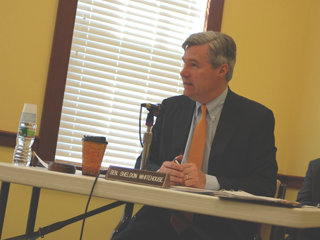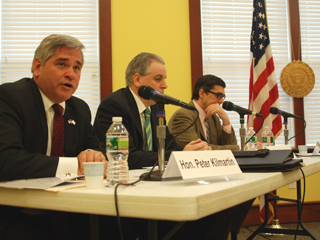
East Providence, RI – U.S. Senator Sheldon Whitehouse (D-RI) today convened an official field hearing of the U.S. Senate Judiciary Subcommittee on Crime and Terrorism in East Providence, RI, to examine ways to reduce costs and strengthen health care programs like Medicare and Medicaid by cracking down on fraud in the system. The hearing featured testimony from top Rhode Island law enforcement officials, local health care professionals, and a representative of the Centers for Medicare and Medicaid Services (CMS).
“Tens of thousands of Rhode Islanders rely on Medicare and Medicaid, but rising costs, fraud, and abuse threaten to undermine these critical programs,” said Whitehouse, who chairs the Subcommittee in the Senate. “Today’s discussion among federal and state prosecutors, CMS officials, and representatives of the senior and health care provider communities will help Congress enact new tools to fight fraud. We all have a role to play in protecting these programs from fraud.”
Today’s hearing, entitled “Protecting Medicare and Medicaid: Efforts to Prevent, Investigate, and Prosecute Health Care Fraud,” focused on efforts to thwart and prosecute instances of fraud to help reduce costs without affecting benefits.
“The Rhode Island Attorney General’s Office . . . works in conjunction with state agencies, the private sector, citizens and the federal government to prevent, investigate and ultimately prosecute cases of health care fraud, particularly in Medicaid,” said Rhode Island Attorney General Peter F. Kilmartin in his testimony. “In 2011 this process led to the recovery of nearly $1.2 million, not including cases that are still under investigation. But there is more to be done to prevent fraud and abuse.”

“With the rising cost of medical care, every dollar stolen from our health care programs is one dollar too many,” testified U.S. Attorney for the District of Rhode Island Peter F. Neronha. “For these reasons, fighting health care fraud is a priority of the Department of Justice.”
Ted Doolittle, Deputy Director of the Center for Program Integrity at the U.S. Department of Health and Human Services Centers for Medicare and Medicaid Services, testified that, “Thanks to recent legislation passed by Congress giving CMS new resources and tools to fight fraud, CMS is using new technology to make significant improvements to the twin pillars of CMS’ program integrity efforts: fraud detection and provider enrollment.”
“It is also essential that we harness the volunteer power of Medicare beneficiaries themselves to do this work,” said Catherine Taylor, Director of the Rhode Island Division of Elderly Affairs. “No one is better positioned to recognize fraud, or more invested in ensuring that Medicare dollars are there for them, not the scam artists.”
“Medicare and Medicaid fraud and abuse is a targeted problem which requires a targeted solution,” testified Mary Benway, President of the Rhode Island Partnership for Home Care. “The expensive spending growth and overutilization of services is not difficult to identify and with oversight from committees like this, I am confident that we can restore the public trust, save valuable resources and provide exceptional care to those in the Medicare and Medicaid programs.”
Whitehouse was a cosponsor of bipartisan Medicare fraud-fighting legislation, signed into law in 2010 as part of the Small Business Jobs Act, that required Medicare to adopt state-of-the-art technology – predictive modeling systems such as those currently used by the credit card and banking industries – to identify fraudulent claims and billing patterns before taxpayer funds are spent. In the current Congress, Whitehouse is a cosponsor of the bipartisan Medicare and Medicaid Fighting Fraud and Abuse to Save Taxpayers’ Dollars (FAST) Act, which would improve CMS’s ability to stop fraudulent claims before they are paid out, cut down on fraud in the Medicare Part D prescription drug program, and strengthen penalties for certain types of fraud.
###
